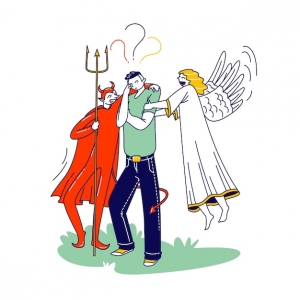
.jpg)
A mother returning home from a nearby market found her favourite vase broken into fragments and lying scattered about, and her two teenage boys hiding behind the room curtain. The entire scene infuriated her, and she howled at the mischief-makers. "Who broke the vase?" She asked in an intimidating voice. "Ravi," came the answer from Nagu. "How did he break it?" she asked, and Ravi replied, "I threw it at Nagu, and he didn't catch it."
Ravi did the mischief but was not ready to take responsibility for it. That is because people love to blame others. It comes in handy, too. All of us are prone to blaming society for our shortcomings and failures rather than our own precious selves. We blame our food when we have no appetite. The danseuse, too, blames the stage when her legs are too tired. Numerous examples can be given, and they will continue to flood our minds. "Let not the sword blade mock its handle for being blunt," says Rabindranath Tagore.
One needs courage to accept their own mistake. This is called moral courage. For fear of being punished, many of us blame others to escape from the situation. That is the easiest and most sensible way. That is what we think. But what we failed to ask us, "will it carry me far?" Yet if we ask, the answer would be a blatant 'no.'
Then, an immediate question arises: "Will I be appreciated for telling the truth?" Surely and certainly. Imagine how you would feel if someone else had blamed you for something you didn't do. Even if you make your escape by blaming others, you are not a victor... You will never be one.
Instead, you will be called a coward... Coward because you cannot face up to your mistake. Only a fool would make an asset of his lie-ability. You are bound to lose your face and become unpopular. He who accepts his fault will not be looked down upon. For the courage he displayed, for the truth he spoke, people are bound to esteem him.
In any case, we should never be like the absent-minded professor who, having forgotten to carry home his umbrella, called ten shops asking for it. Having found it in the eleventh shop appreciated its owner thus: "This is the only honest shop in town all the others are... You know what I mean."
Only two kinds of people dominate Planet Earth. Those who are frank belong to the first category. They are not afraid of public opinion. They know the public opinion would be in favour of them for kind-hearted people know even 'Homer nods.'
However, it is the second category of people who should be feared. They hide things. They are always in favour of themselves. Maybe they are 'Caesar's wife.' They are the most dangerous people… they are to be shunned.
A host once complained to her guest that her immediate neighbour was a poor housekeeper. She also said that it was a disgrace to be her neighbour, as her children always looked dirty and her house was filthy.
"Take a look at those clothes she has hung out on the line. You can see those black streaks up and down those clothes," remarked the host with a contemptuous snort. Seconds later, the guest commented: "The clothes are perfectly clean… the streaks that you see are on your window… clean your window."
If beauty depends on the onlooker's eyes, then dirt, too. All that we have to do is develop the habit of looking at ourselves through others' eyes and viewing our critics as our mirrors. That way, we will see ourselves as others see us.
Giving advice to others is another easiest thing. The most difficult thing is to follow what we preach. "Don't do this... Do this..." Don't you think that it is too easy to say these five little words? But how difficult it is to follow them! Try and fail... Experience counts. Or try… try again and succeed. That experience also counts.
Instead of blaming others to hide your mistakes and advising others with your unwanted ideas, speak to please the world and eat to please yourself. For Heaven's sake, do not forget the proverb, "For the belly's sake we put on many a disguise."
I leave you with one of the loveliest of the old Irish blessings:
May the road rise to meet you.
May the wind be always at your back.
May the sun shine warm upon your face.
May the rains fall soft upon your fields.
And
May God hold you
In the palm of His hand.